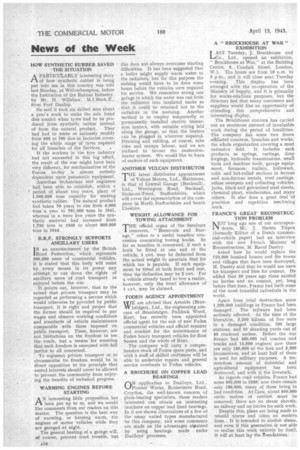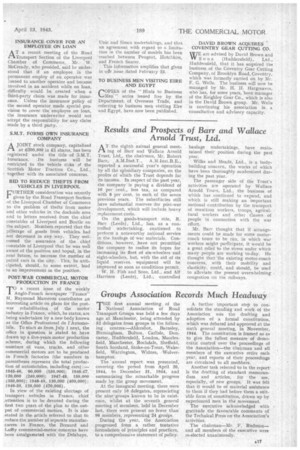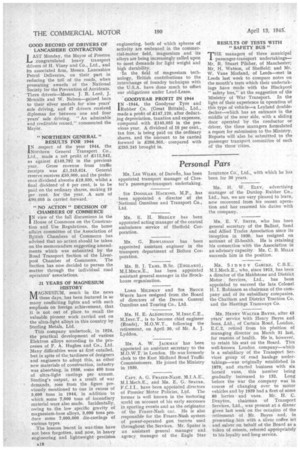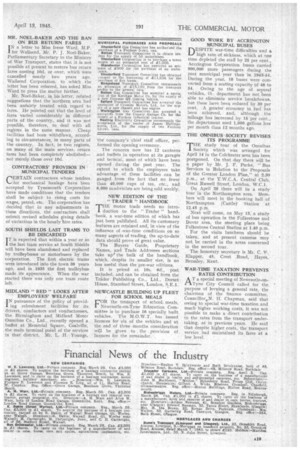News of the Week
Page 18

Page 19

Page 20

Page 21

If you've noticed an error in this article please click here to report it so we can fix it.
HOW SYNTHETIC RUBBER SAVED THE SITUATION
APARTICULARLY interesting story of how synthetic rubber is being put into use in this country was told last Monday, at Wolverhampton, before the Institution of the Rubber Industry, by Mr. H. Willshaw, M.I.Mech.E., from Fort Dunlop.
He said it took six skilled men about a year's work to make the new tread dies needed when tyres had to be produced from synthetic rubber instead of from the natural product. They had had to make or seriously modify from 600 to 700 dies in factories covering the whole range of tyres required for all branches of the Services. .
If the workers in the tyre industry had not succeeded in this big effort, the result of the war might have been very different, for mechanization of the Forces to-day is almost entirely dependent upon pneumatic equipment.
Ameriban technicians and engineers had been able to establish, within a ' period of about two years, plant of 1,000,000 tons capacity for making synthetic rubber. The natural product had taken 70 years to rise from 4.004 tons a year to 781,000 tons in 1941, whereas in a mere. five years the synthetic material had increased from 1,750 tons in 1939 to about 800,000 tons in 1944.
B.R.F. STRONGLY SUPPORTS ANCILLARY USERS
I N au announcement by the British Road Federation, which represents 300,000 users of commercial vehicles, it is stated that this body will resist by every means in its power any attempt. to cut down the rights of ancillary users of road transport as enjoyed before the Ni-ar.
it Taints out, however, that to the extent that private transport may be regarded as performing a service which would otherwise be -provided by public transport, it is right and proper that the former should be required, to pay wages and observe working conditions and standards of vehicle maintenance comparable with those imposed on public transport. These, however, are not limitations on the freedom to use the roads, but a Means for ensuring that such freedom is exercised with lull justice to all concerned.
To regiment private transport or, to circumscribe its freedom would be in direct opposition to the principle that vested interests should never be allowed to 'prevent the community from enjoying the benefits of technical progress.
WARMING ENGINES BEFORE STARTING
AN interesting little proposition has been put up to us, and we would like comments from our readers on this matter. The question is the best way of warming, or keeping warm, the engines of motor vehicles while they are garaged at night.
The general heating of a garage will, of course, prevent frost trouble, but
this does not always overcome starting difficulties. It has been suggested that a boiler might supply warm water to the radiators, but for this purpose the stoking would have to be done some hours before the vehicles were required for service. We remember seeing one garage in which the water was run froM the radiators into insulated tanks so that it could be returned hot to the radiators in the morning. Another method is to employ temporarily or permanently installed electric immersion heaters, with suitable wiring laid along the garage, so that the heaters can be plugged in wherever required. Draining and refilling, of course, take time and occupy labour, and we are inclined to favour the immersionheater system. We would. like to learn of makers of such equipment.
ANOTHER VULCAN DISTRIBUTOR
THE latest distributor appointment of Vulcan Motors, Ltd., Maidstone, is that of Central Garage (Bucknall), Ltd., Werrington Road, Bucknall, Stoke-on-Trent, Staffordshire, which will cover the representation of the company in North Staffordshire and South Cheshire.
WEIGHT ALLOWANCE FOR TOWING ATTACHMENT
TE official organ of the furniture removers, " Removals and Storage," refers to a useful taxation concession concerning towing hooks. So far as taxation is concerned, if such a hook be fitted at one end of the vehicle, 1 cwt. may be deducted from the actual weight to ascertain that for which tax is payable. If such equipment be fitted at both front and rear, then the'deduction may be 2 cwt. For a vehicle already taxed to tow a trailer, however, only the front allowance of 1 cwt. may be claimed.
FODEN AGENCY APPOINTMENT
WE are advised that Arnold s (Branbridges), Ltd., the engineering concern of Branbridges, Paddock Wood, Kent, has recently been appointed official -agent for the sale of new Foden commercial vehicles and official repairer and stockist for the maintenance of Foden heavy transport vehicles for East Sussex and the whole of Kent,
. The company will carry a comprehensive stock of Foden spare parts, and with a staff of skilled craftsmen will be able to undertake repairs and general service overhauls to Foden vehicles.
A BROCHURE ON COPPER LEAD BEARINGS
1--NN application to Dualloys, Ltd., 'L./Pioneer Works, Rotherrnere Road, Croydon, the well-known concern of plain-bearing specialists, those readers interested can obtain an interesting brochure' on copper lead lined bearings. In it are shown illustrations of a few of the many varied types manufactured by this company, and some comments are made on the advantages ollitained by using bearings made under Dualloys' processes. A " BROCKHOUSE AT WAR" EXHIBITION LAST Tuesday, J. Brockhouse and LICo., Ltd., opened an exhibition, ",Brockhouse at War," at the Building Centre., 9, Conduit Street, London, W.1. The hours are from 10 a.m. to 5 p.m., and it will close next Tuesday evening. This display has been arranged with the co-operation of the Ministry of Supply, and it is primarily for works-relations purposes, but the directors feel that many customers and suppliers would like an opportunity of attending this comprehensive and interesting display.
The Brockhouse concern has carried out an enormous amount of invaluable work during the period of hostilities. The company has some two dozen affiliated concerns, branches and works,' the whole organization covering a most extensive field, It includes such products as springs, castings, drop forgings, hydraulic transmissions, small tools and machine tools, garage equipment, furnaces, trailers, holloware, coldand hot-rolled sections in ferrous and non-ferrous metals, steel castings, refuse sweepers and collecting vehicles, jacks, black and galvanized steel sheets, chemical plant, windscretns, and many others. It also does a great deal 'of precision and repetition machining work.
FRANCE'S GREAT RECONSTRUCTION PROBLEM
NOT long ago one of our correspondents, Mr. J. Harms Tiepen (formerly Editor of a Dutch commercial-vehicle paper) had an interview with the new French Minister of Reconstruction, M. Raoul Dautry.
, Asked how he would replace the 120,000 bombed houses and the towns and villages that have been destroyed, M. Dautry said that he would use oxen for transport and lime for cement. He added that 50 years ago there existed no lorries and no cement, yet, long before that time, France had built some of the most beautiful cathedrals in the world.
Apart from total destruction some 1,200,000 buildings in France had been damaged. The railways had been seridusly affected. At the time of the liberation, 3,200 kliorns. of line were in a damaged condition, 100 large stations, and 20 shunting yards out of 40 rendered useless. Before the war France had 460,000 rail coaches and trucks. and 15,000 engines; now there are only 160,000 of the first and 5,300 locomotives, and at least half of these is used for military purposes. A tremendous amount of industrial and agrictiltural equipment has been destroyed, and with it the livestock,
As regards road vehicles, France had some 500,000 in 1939; now there remain -only 186,000, many of these being in bad condition. At Caen, about 500,000 cubic metres of rubbish must be removed; there are no steam shovels, no railway and no lorries for such work.
Despite this, plans are being made to rebuild towns and cities on modern lines. It is intended to abolish slums, and even if this generation is not able to realize this work entirely by itself, it will at least lay the foundations. INSURANCE COVER FOR AN EMPLOYEE ON LOAN
AT a recent meeting of the Road Transport Section of the Liverpool Chamber of Commerce, Mr. W. McCready, who presided, said he understood that if an employee in the permanent employ of an operator was loaned to another operator and became involved in an accident while on loan, difficulty would be created when a ihird-party claim was made for insurance. Unless the insurance policy of the second operator made special provision to cover the employee on loan, the insurance underwriter would not accept the responsibility for any claim made by a third party.
S.M.T. FORMS OWN INSURANCE COMPANY
AJOINT stock company, capitalized at £200,000 in £1 shares, has been registered under the title of S.M.T. Insurance. Its business will be restricted to the vehicle risks 3f the Scottish Motor Traction Co., Ltd., together with its associated concerns.
BID TO REDUCE THEFTS FROM VEHICLES IN LIVERPOOL
FURTHER consideration was recently given by the Road Transport Section of the Liverpool Chamber of Commerce to the problem of thefts from motor and other vehicles in the dockside area and to letters received from the chief constables of Liverpool and Bootle on the subject: Members reported that the pilferage of goods froth vehicles, had not decreased in any way. They welcomed the assurance of the chief constable of Liverpool that he was well aware of the position and hoped, in the near future, to increase the number of patrol cars in the city. This, he anticipated, should, to some extent, lead to an improvement in the position.
POST-WAR COMMERCIAL MOTOR PRODUCTION IN FRANCE
TO a recent issue of the weekly Anglo-French newspaper "France" M. Raymond Marcerou contributes an interesting article on plans for the postwar rehabilitation of the motor industry in France, which, he states, are being undertaken by a new body known as the Office Professionel de l'Autoruobile. To start es from July 1 next, the
• office in question is stated to have drawn up a five-years motor production scheme, during which the following numbers of vans, trucks, and other commercial motors are to be produced in French factories (the numbers in parentheses represent the total production of automobiles, including cars) :— 1945-46, 90,000 (150,000); 1946-47, 120.000 .(240,000); 1947-48, 150,000 (350,000); 1948-49, 130,006 (400,000); 1949-50, 120,000 (470,000).
In view of the existing shortage of transport vehicles in France, chief ,attention is to he devoted during the first two years of the plan to the output of commercial. motors. It is also stated in the article referred to that to reduce the number of separate manufacturers in France, the Bernard and Lafily commercial-motor concerns have been amalgamated with the Delahaye, Unic and Simca undertakings, and that an agreement with regard to a.,limitation in the number of models has been -reached between Peugeot, Hotchkiss, and French Saurer.
This information amplifies that given in ottr issue dated February 23. .
TO BUSINESSMEN VISITING EIRE AND EGYPT
COPIES of the " Hints to Business Men " series issued free by the Department of Overseas Trade, and referring to business men visiting Eire and Egypt, have now been published. DAVID BROWN ACQUIRES COVENTRY GEAR cLITTING CO.
WE are advised by David Brown and Sons (Huddersfield), Ltd., Huddersfield, that it has acquired the business of the Coventry Gear Cutting Company, of Brooklyn Road, Coventry, which was formerly carried on by Mr. F. G. Wells. The business will now he managed by Mr. H. H. Hargreaves, who has, for some years, been manager of the Keighley Gear Co., which is also in the David Brown group. Mr. Wens is continuing his association in a consultative and advisory capacity.
GOOD RECORD OF DRIVERS OF LANCASHIRE CONTRACTOR
LAST Monday, the Mayor of Preston .congratulated heavy transport drivers of H. Viney and Co., Ltd., and Its associated firm, Messrs. Lancashire Petrol Deliveries, on their part in reducing the toll of the roads, when presenting awards of the National Society for the Prevention of Accidents. 'Three drivers—Messrs. J. R. Lord, J. Metcalfe and W. Nelson—gained bars to their silver medals for nine years' safe driving, and 47 drivers received diplomas for between one and four years' safe driving. "An admirable and creditable record," commented the Mayor.
"NORTHERN GENERAL" RESULTS FOR 1944
IN respect of the year 1944, the Northern General Transport Co., Ltd., made a net profit of £112,542, as against £149,792 in the previous year. Gross revenue from traffic receipts was £1,243,624. General reserve receives £50,000, and the preference dividend absorbs £19,500, whilst a final dividend 'of 6 per cent, is to be paid on the ordinary shares, making 10 per cent, for the year. .A sum of £90,605 is carried forward, "NO ACTION" DECISION OF CHAMBERS OF COMMERCE I N view of the full discussions in the House of Commons on the.Construction and Use Regulations, the home affairs committee of the Association of
British Chambers of Commerce has advised that no action should be taken on the memorandum suggesting amendments which was submitted by the Road Transport Section of the Liverpool Chamber of Commerce. The Section has now decided to pursue the matter through the individual road operators' associations.
21 YEARS OF MAGNESIUM HISTORY
lk fiAGNESIUM, much in the news IVA these days, has been featured in so many conflicting lights and with such emphasis on foreign achievement, that it is not out of place to recall the valuable pioneer work carried out on the ultra-light alloyS in this country by Sterling Metals, Ltd.
This company undertook, in 1924, the practical development of various Elektron alloys according to the processes of F. A. Hughes and Co., Ltd. Many difficulties were at first entailed, but in spite of the, tardiness of designers and engineers to adopt this, as other new materials of construction, industry was absorbing, in 1936, some 400 tons of ultra-light castings per annum, Sterling's output, as a result of war demands, rose from the figure previously mentioned to one in excess of 3,000 tons in 1944, in addition to which some 7,000 tons of incendiary material were also made. Incidentally, owing to the low specific gravity of magnesium-base alloys, 3,000 tons produce some 7,000,000 die-castings of various types.
The lessons learnt in war-time have not been forgotten, and now, in heavy engineering and lightweight precision engineering, both of which spheres of activity are embraced in the commercial-motor field, magnesium and its alloys are being increasingly called upon to meet demands for light weight and high durability.
In the field of magnesium technology, British contributions to the interchange of foundry technique with the U.S.A. have done much to offset our obligations under Lend-Lease.
'GOODYEAR PROFIT IN 1944
IN -1944, the Goodyear Tyre and Rubber Co. (Great Britain), Ltd., made a priafit of £147,120, after deducting depreciation, taxation and expenses, compared with £145,055 in the previous year. A dividend of 16 per cent., tax free, is being paid on the ordinary shares, and the amount to be carried forward is £286,365, compared with
285,245 brought in. RESULTS OF TESTS WITH "SAFETY BUS"
THE managers of three municipal passenger-transport undertakings— Mr. R. Stuart Filcher, of Manchester; Mr, H. Watson, of Sheffield; and Mr. W, Vane Morland, of Leeds—met in Leeds last week to compare notes on the month's tests which their undertakings have made with the Blackpool " safety bus," at the suggestion of the Ministry of War Transport. In the light of their experience in operation of this type of vehicle—a Leyland doubledecker—which has an entrance in the middle of the near side, with a sliding door operated by the conductor or driver, the three managers formulated a report for submission to the Ministry. Reports will also be submitted to the passenger transport committee of each of the three cities.
MR. NOEL-BAKER AND THE BAN ON BUS RETURN FARES
IN a letter to Miss Irene Ward, M.P. for WaWend, Mr. P. J. Noel-Baker, Parliamentary Secretary to the Ministry of War Transport, states that it is not possible at present to restore bus return fares costing 10th or over, which were cancelled nearly two years ago. Wallsend Corporation, to which the letter has been referred, has asked Miss Ward to press the matter further.
Mr. Noel-Baker, in his letter, refuted suggestions that the 'northern area had been unfairly treated with regard to fares. He pointed out that the level of fares varied considerably in different parts of the .country, and it was not possible, therefore, to deal with all regions, in the same manner. Cheap facilities had been withditawn, according to circumstances, in many parts of the country. In fact, in two regions, on many of the main services, return fares had been completely abolished— not merely those over 10d.
CONTRACTORS' PROVISOS IN • MUNICIPAL TENDERS
rERTAIN contractors whose tenders k....for, mechanical haulage have been accepted by Tynemouth Corporation have made conditions that the tenders shall be subject to rising costs for wages, petrol, etc. The corporation has decided that in any adjustments in these directions, the contractors shall submit revised schedules giving details of variations in the hourly hire rates.
SOUTH SHIELDS LAST TRAMS TO BE DISCARDED
IT is expected that within a year or so
the last tram service at South Shields will have been abandoned and replaced by trolleybuses or motorbuses by the corporation. The first electric trams Were introduced into the town 39 years ago, and in 1935 the first trolleybus made its appearance. When the war started there was only one tram route left.
MIDLAND " RED " LOOKS AFTER EMPLOYEES' WELFARE
IN pursuance of the policy of provid ing ing refreshment facilities for its drivers., conductors and conductresses, the Birmingham and Midland Motor Omnibus Co., Ltd., recently opened a buffet at Memorial Square, Coalville, the main terminal point of the services in that district. Mr. L. H. Youngs, the company's chief staff officer, performed the opening ceremony.
The concern now has 12 canteens And buffets in operation at its garages and termini, most of which-have been opened during the past year. The extent to which the employees take advantage of these facilities can be gauged from the fact that no fewer than 40,000 cups of tea, etc., and 6,000 sandwiches are being sold weekly.
NEW EDITION OF THE "TRADER " HANDBOOK THE motor trade needs no intro1 &lotion to the " Trader " hand'book, a war-time edition of which has just been published. All its customary features are retained and, in view of the influence of -war-time conditions on so many aspects of trading, the up-to-date data should prove of great value.
The Buyers Guide, Proprietary Names, and Trade Addresses sections take up' the bulk of the handbook, which, despite its smaller size, is no less useful than the pre-war editions.
It is priced at 10s. 6d., post included, and can be obtained from the Trader Publishing Co., Ltd.. Dorset Hduse, Stamford Street, London,
NEWCASTLE BUILDING UP FLEET -FOR SCHOOL MEALS
FOR the transport of school. meals, Newcastle-on-Tyne Education Committee is to purchase 16 specially built vehicles. The M.O.W.T. has issued licences for -six of the vehicles and at the end of three 'months consideration will be given to the 'provision of licences for the remainder. ,
GOOD WORK BY ACCRINGTON MUNICIPAL BUSES
DESPITE war-time difficulties and a high rate of sickness, which at one time depleted the staff by 25 per cent., Accrington Corporation buses carried 900,000 more passengers during the past municipal year than in 1943-44. During the year, 18 buses were converted from a seating capacity of 48 to 54, Owing to the age of se:yeral vehicles, th department has not been able to eliminate service breakdowns, but these have been reduced by 30 per cent. . A greater economy in fuel has been achieved, and, although the mileage has increased by 15 per cent., the department used 1,000 gallons less per month than 12 months ago.
THE OMNIBUS SOCIETY REVISES ITS PROGRAMME
THE study tour of the Omnibus Society which was arranged for April 14 in the Colchester area has been postponed. On that day there will be a paper by Mr. J. F. Parke, "Bus Services in Relation to the Proposals of the Greater London Plan," at 2.30 p.m., at the Y.W.C.A. Central Club, Great Russell Street, London, W.C.1.
On April 29 there will be a study tour in the Northampton area. Members will meet in the booking hall of Northampton. (Castle) Station at 12.45 p.m.
Next will come, on May 13: a study of bus operation in the Folkestone and Efovtr area, the Meeting place being Folkestone Central Station at 1.40 p.m.
For the visits luncheon should be taken, and at present cameras may not be carried in the areas concerned in the second tour.
The honorary secretary is Mr. C. 'F. Klapper, 45, Crest Road, Hayes, 13romley, Kent.
WAR-TIME TAXATION PREVENTS RATES CONTRIBUTION
AT a special meeting of Newcastle-onTyne City Council called for the purpose of levying a general rate, the chairman of the finance committee, Councillor.N. H. Chapman, said that owing to special war-time taxation and much higher working costs, it was not possible to make a direct contribution to the rates from the transport undertaking, as in previous years. He said that despite higher costs, the transport service had maintained its fares at a low level.




















































